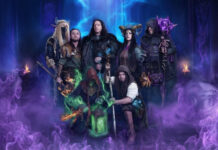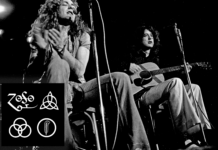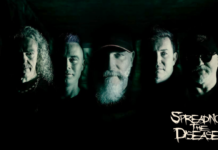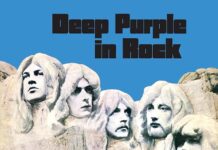After no new studio albums from Jethro Tull between 2004-2022, we now get two inside one year. Hot on the heels of 2022’s The Zealot Gene comes RökFlöte, an album finding Ian Anderson and the band returning with a 12-track album based upon the characteristics and roles of some of the principal gods of the old Norse paganism as well as, at the same time, exploring the RökFlöte .. rock flute .. which Jethro Tull helped to make an iconic instrument.
Ian Anderson’s initial idea has been to record an instrumental album for rock flute, but this changed along the way as the subject matter on the album became clearer to him, and he became drawn to the term ‘Ragnorak,’ from Norse mythology, which translates as ‘Destiny of the Gods.’ Norse mythology was usually avoided due to its perceived association with death metal bands, but Anderson saw the opportunity to write about this as a challenge, and out of this has emerged RökFlöte, a worthy successor to The Zealot Gene, containing some of Anderson’s more interesting lyrical content, and an album where Jethro Tull’s ability to combine folk, prog and rock has enabled them to continue creating their own unique sound, which has seen the band becoming one of the ‘most commercially successful and eccentric prog rock bands.’
Any band cited as an influence by Dream Theatre, Iron Maiden and Rush, amongst others, has clearly done something right down the years. And this despite the fact Ian Anderson has always gone out of his way to maintain a solidly individualistic approach to whatever Tull does, with the iconic flute always to the fore.
The familiar voice of Ian Anderson and his trilling flute are well represented on RökFlöte. ‘Guardians Watch’, a piece about Heimdal, ‘Guardian of the Gods’, gives an idea of what the album might have sounded like had the original idea of being a wholly instrumental piece been pursued, with some delightful acoustic guitar work to accompany the flute. Tracks like ‘Trickster (& the Mistletoe),’ about Loki, brother of Thor, and ‘Allfather,’ about Odin, have the feel of outtakes from previous Jethro Tull albums .. no bad thing. Longtime fans still say it can’t be Jethro Tull without longtime guitarist Martin Barre, but the guitar work of Joe Parish-Jones, particularly on ‘Ginnungagap’ and ‘Guardians Watch’, is at least as good as anything Martin Barre ever contributed. There are several rocky tracks, like ‘Ithavoll,’ rebirth after Ragnarok, and ‘The Navigators,’ about Njord, to go alongside quieter, more reflective songs like ‘The Perfect One,’ about Baldr, and ‘Cornucopia,’ about Freyr.
Overall, the album is slightly heavier and a little more proggy than Zealot Gene, pleasant and delightfully airy in places with the voice being used sparingly. RökFlöte proves, for a man approaching his mid-seventies, Ian Anderson is still capable of writing and producing very imaginative music. He still has his gift for an appropriate melody and, who knows, just maybe, at some future point, RökFlöte will be rerecorded but purely as an instrumental piece.



















